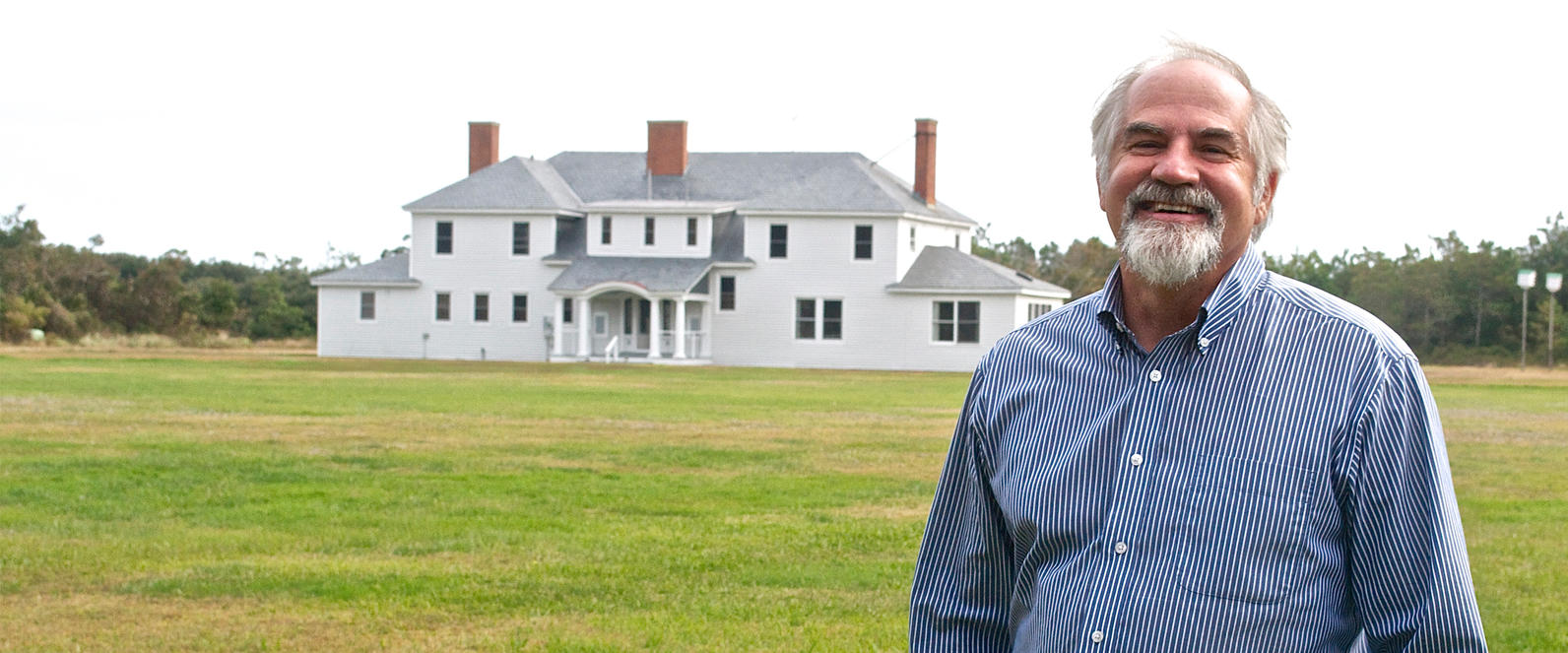Audubon North Carolina has an amazing staff across the state dedicating their time and expertise to protecting birds and their habitats, and engaging others to support bird conservation efforts. In this blog series, we will introduce you, our supporters, to the names and faces behind Audubon NC.
This month, get to know Robbie Fearn, Center Director at the Donal C. O’Brien, Jr. Sanctuary and Audubon Center in Corolla. Robbie oversees Audubon’s conservation work in northeastern NC, engaging citizens and scientists to understand the importance of preserving bird habitats on the Outer Banks.
Describe your job with Audubon NC.
I oversee the day-to-day operations and development of the Donal C. O’Brien Jr. Sanctuary and Audubon Center as it evolves into a research and education campus tucked quietly into a pristine wildlife preserve. Here, we will advance our knowledge and love of wild places, and help our communities, people and wildlife respond to a changing environment.
What inspired you to pursue a career in conservation?
I was always an outdoorsy type, but my first career was in the professional theater, which brought me to the Outer Banks of N.C. Here, my future wife Pamela and I founded a sea turtle conservation group, and the rest is history!
What brought you to work with Audubon NC for the benefit of birds?
After a long sojourn through zoos, wildlife hospitals and nature centers in New England and the Deep South, we were ready to return to where it all began. When this job on the Outer Banks was available, and we could come back home, near family and friends in a place we love, doing important work… we jumped at it.

Why do you feel it’s important to protect and conserve birds in North Carolina? Globally?
“To keep every cog and wheel is the first precaution of intelligent tinkering,” said Aldo Leopold, a great American conservationist/writer. Humans are changing the Earth at an unprecedented scale. I believe in saving all the cogs.
How is your work with Audubon specifically helping to protect birds in NC? What particular birds does your work help protect?
We work to save and restore the great landscape of the Currituck Sound by focusing on the infrastructure of the ecology. Here, we are preserving and enhancing places for birds and other creatures to thrive. Because Audubon’s climate science identifies this space as being in the top 2% in the country of places critical for bird survival, we have an obligation to make sure it is here and functioning in perpetuity.
We also focus on the following priority species:
- American Black Duck
- Black Rail
- Black Skimmer*
- Brown-headed Nuthatch*
- Chuck-wills Widow
- Clapper Rail
- Common Tern*
- Great Egret
- Green-winged Teal
- King Rail
- Least Bittern
- Least Tern*
- Little Blue Heron
- Northern Pintail
- Prothonotary Warbler*
- Saltmarsh Sparrow*
- Sanderling*
- Seaside Sparrow*
- Semipalmated Sandpiper*
- Snowy Egret
- Tricolored Heron
- Tundra Swan
- Western sandpiper*
- White Ibis
- Wood Thrush*
What is your favorite bird? Why?
I love a Chuck-will’s Widow. It is a secretive forest bird whose distinctive song – similar to a Whip-poor Wills’, always reminds me of summer nights when the world is glorious, peaceful and alive with promise.
What is the most exciting bird you’ve ever spotted? What happened?
My first wood stork. Pamela and I were canoeing in a meandering river in coastal Georgia. We rounded a bend and this prehistoric looking creature arose right in front of us. Magical!
What advice do you have for someone interested in becoming involved with bird conservation efforts?
Get involved in one project; it can be small. I started making a bluebird box trail as a boy scout. Volunteering leads to connections that lead to more opportunities.
What would you like people to know about birds that they may not already know?
Birds are our constant companions. The House sparrow, which evolved in the Middle East, lives at almost every site on the planet where people live. Birds are harbingers of joy and sorrow; they provide metaphors and meaning in our lives. Not bad for a bunch of dwarf dinosaurs.
Robbie earned his bachelor’s degree in Communications and Theater from UNC-G. He earned his master’s in Environmental Studies with a Communications concentration from the Antioch New England Graduate School. He holds a certificate in Non-Profit Executive Leadership from The National Graduate School of Quality Management and another from the Alabama Association of Non-Profits.
Robbie’s Publications
- Author: Whole Terrain, Communiqué, Wild Magazine, Cape Cod Times
- Editor/Publisher: Triton - A Polar Bear's First Year and Small World/ Big Bear



